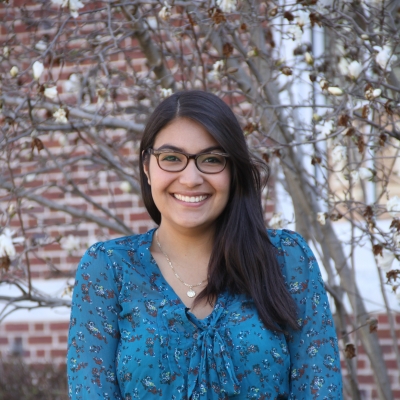Kimberly (Kim) Higuera, 2014
Kimberly (Kim) Higuera, a Sociology major, graduated with two certificates: one in Latino/a Studies in the Global South and a second in Child Policy research.
How did your interest eventually evolve into a decision to pursue the certificate?
I first got interested in pursuing the Latino/a Studies Certificate when a student form the Latino/a Studies in the Global South came to my Spanish class to discuss what the program was, and how it was different from other certificate programs dealing with Latin American issues.
Unlike similar programs, the Latino/a Studies in the Global South Certificate dealt directly with the Latino persona and experience in the United States. Until I got to Duke, I never really had the chance to dive into this subject matter before. Though the term 'Latina' described me, I wasn’t sure what it meant, how it related it to me, or how it came to be. In part, I decided to pursue the certificate as an exploration of myself, but also because I finally had the opportunity to learn about Latinidad that I had never had elsewhere.
How has Latino/a Studies changed, or shaped your understanding of how society works?
Latino/a Studies has definitely taught me to see the world in a more holistic sense. It has also allowed me to see the interconnectedness of issues not only dealing with Latinos, but all kinds of issues. Both the introductory and capstone course for the certificate had an interdisciplinary approach that allowed me to extend my interest in Latino issues to my other academic interests. For example, I majored in Sociology with another certificate in public policy relating to children and families, in my Honors thesis now I work with all three of these subject matters. My thesis is in Sociology dealing with the experience of Latino and Asian child translators in immigrant families. The Latino/a Studies courses helped me realize that in order to understand, or even being to understand, a certain issue, I had to see the issue as multi-faceted.
What is some advice that you would give other students pursuing a certificate in Latino/a Studies?
I would advise students that go into Latino/a Studies to engage with the new material with an open mind, and attempt to think about the issues dealing with Latino/a Studies with a sort of in-between mentality. Latinos are often described as “neither here nor there” because we are a group that is between the mother culture of our parents and the Anglo-culture of the U.S. Approaching Latino issues from only one of these perspectives—the Latin American immigrant or the Anglo majority perspective—is not enough, because Latinos encompass a smashing together of both of these perspectives into something new.

